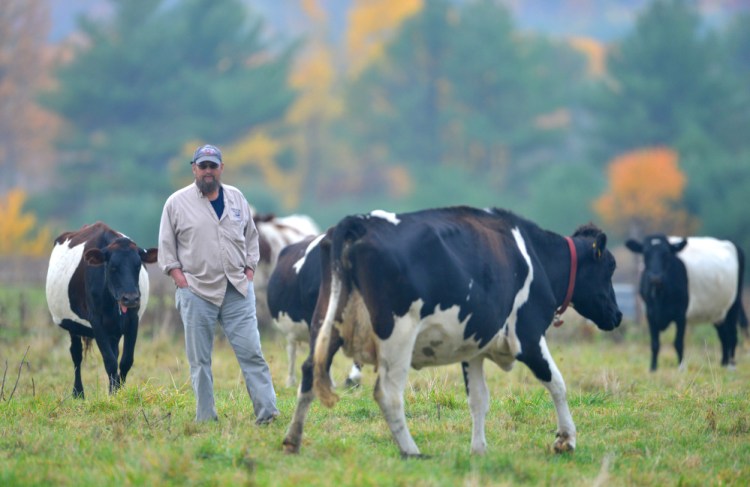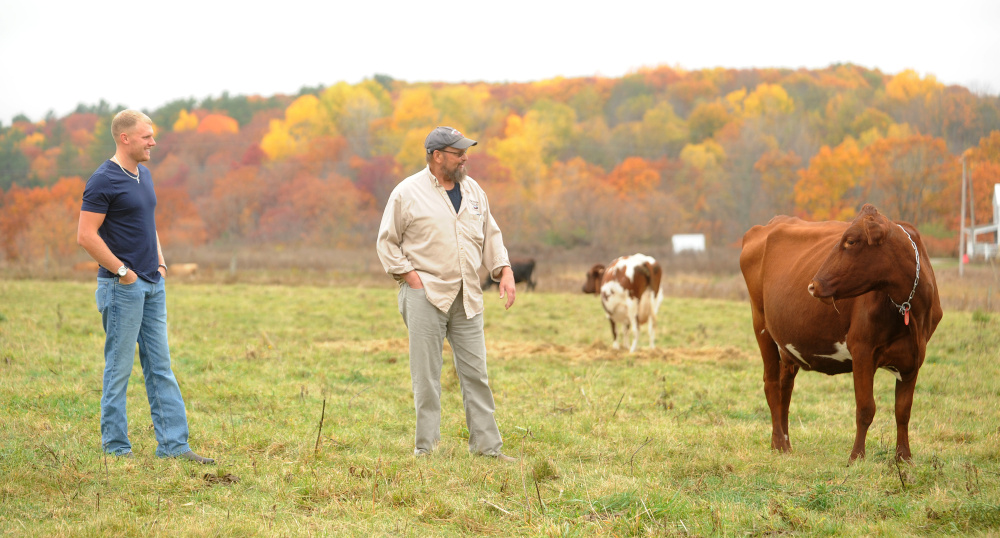WINSLOW — A pair of farms in town may be among the first to benefit from a first-of-its-kind program in Maine that aims to keep working farms in operation by forgiving local property taxes.
The first municipal commission on agriculture in the state of Maine has received its first applications for a temporary conservation program that would provide tax relief to farmland owners. The Winslow Agricultural Commission recently met to discuss the applications it received for the Voluntary Municipal Farm Support Program, which was created through legislation years ago but was never incorporated by a town until now.
Commission members are hoping to make it easier for farmers to stay in Winslow, to preserve the rural character of the town and to potentially bring back agricultural businesses following decades of decline.
“There’s a group of us that want to have agriculture be a sustainable part of our economy as we move along,” said Elery Keene, commission member and Winslow Planning Board member.
The support program sets up an agreement between the town and those who own farmland requiring the landowners to conserve the farmland for 20 years. In exchange, the town gives the landowners “farm support payments” equivalent to the assessed property taxes each year. In other words, the farms don’t have the burden of property taxes.
The program was established in the state through legislation in June 2007. In “An Act to Support Farms and Limit Sprawl,” John Piotti established a way for Maine towns to keep their open land and also keep their farmers in business.
Piotti, who was serving in the Maine House of Representatives at the time, is now the president of the American Farmland Trust in Washington, D.C. After working with farmers for more than 20 years, Piotti said he sees that land protection is a necessity.
“When I did that (sponsor the legislation), there were relatively few ways to protect farmland,” he said in a phone interview. In 2007, farmers could either donate their land to a land trust or try to go through the Land for Maine’s Future Program.
Piotti’s program gave the farmer, or landowner, compensation for saving the land for the community, which ends up being a win-win anyway, he said.
“Just having land stay in farmland is the best deal for municipalities,” he said. “Cows don’t go to school.”
After researching the needs of the town and working on a set of strategies, Winslow became the first town to institute the program.
TAX IMPACT
The potential tax shift is the only concern the support program seems to raise, but it shouldn’t cause a large change, officials said.
Councilor Ken Fletcher said the Town Council intends to be “very careful” about how many farms it accepts for the program each year.
“We can only do so much,” he said. “Over time we can probably do a few thousand dollars. Fortunately we do have reasonable growth in the tax base.”
The council supports the program, Fletcher said, because “people value (farmland)” for the “special character” it adds to the town and the local food it provides, and they realize one of the barriers to keeping open land is that “things can be pretty tight” financially.
“We’ve got to do things that strike that balance,” he said.
The town assessor, Judy Mathiau, looked at a dozen properties in Winslow that would be eligible for the support program. Using a tax rate of $15.50, Mathiau found that the town would potentially lose $12,832 in property tax dollars annually.
The increase in the tax rate would be $0.02.
For the two properties that applied for support this year, the town would lose about $7,000 in taxes, which comes to a tax rate increase of about $0.01.
One of the two applicants is Steve Russell, a town councilor and commission member whose family owns a dairy farm in town.
Kate Newkirk, who co-chairs the commission, said she can see the commission sending five or six properties each year to the Town Council for consideration. From there, the council would choose which farms would get support.
Other members talked about the potential spread of the program now that one town has taken on the task of starting from scratch.
“To me, it would be a success if the surrounding communities took this up and took two or three per year,” Russell said.
‘HARD TO BE FIRST’
The process started in March 2013, when a working group on agriculture formed in Winslow. After surveying local farmland owners, the group gave a report to the Winslow Town Council with strategies meant to target common problems.
The group sent out about 60 surveys and got 17 back. Respondents listed lower taxes, good zoning, preservation and farm equipment signage as what would be most helpful to them.
In 2014, the commission was formed with help from the state Department of Agriculture, Conservation and Forestry.
The commission’s first priority was to create a support program, which was completed in May 2016 when the Town Council voted 6-0 in favor of the ordinance to start the program with Russell recusing himself from the vote.
Eligibility for the support program is limited to properties of 5 acres or more that are producing an agricultural commodity. The commodity can be for the landowner’s personal use, but the land must produce at least $2,000 worth of whatever it is — grains, vegetables, livestock — to be eligible. Farm buildings still used for farming activity are also eligible.
If the commission recommends the property be approved for a 20-year farm support arrangement and the Town Council votes in favor of the recommendation, then the town will reimburse the landowner’s paid property taxes for the 20 years, barring any changes or failures to comply with the arrangement.
Every year the landowner submits a farm income report, and every two years the property is subject to an inspection. The landowner can request eligibility reviews for several reasons: lack of income, infirmity, catastrophic property loss and more.
While the program is sorting out its growing pains and discovering what parts of the application should be more clear, departments and organizations applaud it for taking on the challenge of being first.
“It’s hard to be first,” Piotti said. “I give Winslow a lot of credit.”
The legislation for the program left a lot of room for towns to set their own rules, which can be both a benefit and a drawback, Piotti said.
Stephanie Gilbert, who works for the agriculture department as a farm viability and farmland protection specialist, said she thinks other towns should, after learning the basic rules, look to Winslow if they consider incorporating a farm support program.
“Towns interested in it really should, I think … learn more from Winslow directly,” Gilbert said. “We’re grateful to Winslow for being a pioneer.”
KEEPING FARMS ALIVE
Winslow has seen a large shift in its local agricultural industry, members of the commission said.
There were about 20 dairy farms alone in the town in the 1970s, according to research Russell has done.
There was also an abundance of infrastructure to support surrounding farmers and their farms. Winslow had a regional facility for West Lynn Creamery, two slaughterhouses and a full-service Agway with experts on staff to field farmers’ questions, commission members said.
“Almost every drop of milk that went from Maine to Boston went through Winslow,” Russell said.
Now, the creamery has gone out of business, as have the slaughterhouses, and the Agway store sells tools instead of grain, but the commission still sees hope to revitalize the town’s agricultural roots, and Piotti agrees.
“Unlike 25 years ago … increasingly in some sectors of farming, we’re seeing a real resurgence,” Piotti said, in part because farming is one job that seems to “really resonate with young people.”
The first step in getting the infrastructure back, he said, is protecting farmland.
For the past 25 years, he said, “we’ve kept farms alive and allowed some farms to thrive by realizing how to market directly” through programs like farmers markets.
“What we really need to do is scale up our farming a little bit, so that it’s easier to get products into more conventional markets,” Piotti said.
The commission members also see this program as a potential stepping stone to “forever” conservation easements, which some landowners may be hesitant to sign on to at first.
“One of our hopes was someone would enter this program because they were skeptical of the Maine Farmland Trust program because it was forever,” Russell said. “This could be a small step to a forever farm.”
Ellen Sabina, outreach director at Maine Farmland Trust, said the program could complement their work and that it is a “great tool to have in the toolbox.”
“I think the more we can support farmers now the better,” she said, “and the better chance the lost infrastructure pieces will have to come back.”
Madeline St. Amour — 861-9239
mstamour@centralmaine.com
Twitter: @madelinestamour
Send questions/comments to the editors.





Success. Please wait for the page to reload. If the page does not reload within 5 seconds, please refresh the page.
Enter your email and password to access comments.
Hi, to comment on stories you must . This profile is in addition to your subscription and website login.
Already have a commenting profile? .
Invalid username/password.
Please check your email to confirm and complete your registration.
Only subscribers are eligible to post comments. Please subscribe or login first for digital access. Here’s why.
Use the form below to reset your password. When you've submitted your account email, we will send an email with a reset code.